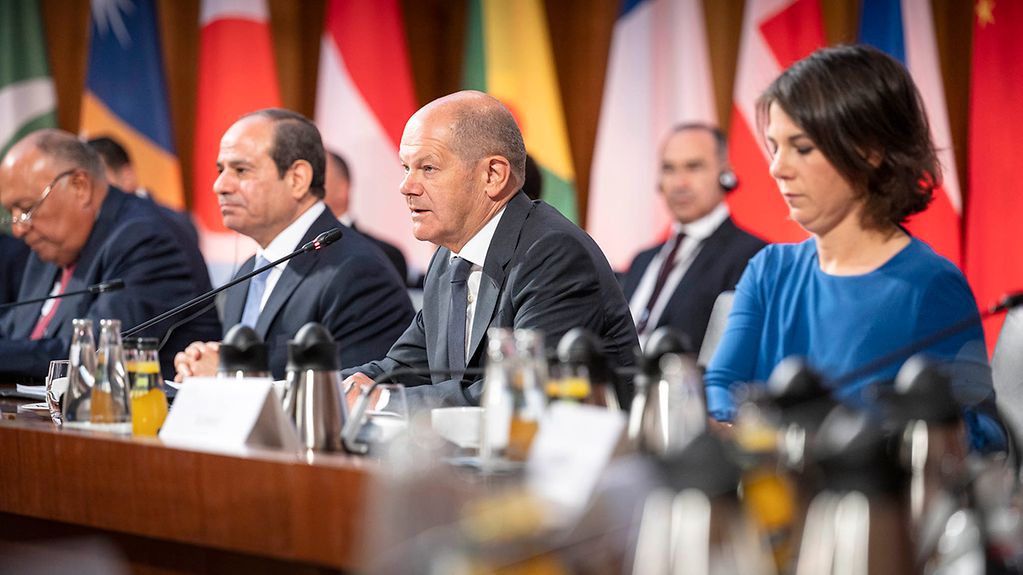13th Petersberg Climate Dialogue
At the Petersberg Climate Ddialogue, Federal Chancellor Scholz described the national and international challenges involved in the fight against climate change: to promote climate protection while at the same time securing and creating prosperity.

Federal Chancellor Scholz with Foreign Minister Annalena Baerbock at the Petersberg Climate Dialogue: “Climate protection succeeds if brings a noticeable improvement to our lives.”
Photo: Federal Government/Bergmann
At the 13th Petersberg Climate Cialogue in Berlin, Federal Chancellor Olaf Scholz affirmed the significance of international climate protection. “In 30 years’ time, there will probably be two billion more people on earth, particularly in Africa, Asia and South America. Do we really believe that we can present them with a choice between climate protection and prosperity?”
There must be a prospect of prosperity and an intact planet for all of them, said Scholz at the start of the conference at the Federal Foreign Office in Berlin. The agenda this year includes, in particular, questions of international climate funding and energy policy, adaptation to climate change and the development of greenhouse gas emissions.
The Federal Government has been organising the Petersberg Climate Dialogue since 2010. In the first year, it took place at Petersberg in Bonn. The meeting is held to prepare for the annual United Nations Climate Change Conference (COP), and has established itself as a fixed component of international climate policymaking. Each year, the Federal Government invites the responsible ministers from around 40 states to the meeting. The co-chair is always the country that will chair the next COP. This year’s co-organiser is Egypt. The COP27 will take place from 7 to 18 November 2022 in Sharm El-Sheikh, Egypt.
Climate protection is a joint task
The Federal Chancellor appealed to the solidarity of societies, saying that climate protection would only be successful if it were supported by a broad majority of societies. “Climate protection succeeds if brings a noticeable improvement to our lives,” said Scholz, “for example by modern, affordable energy provision, by wind and solar power plants.” The challenge would be to promote climate protection while at the same time securing and creating prosperity, he said.
Global C02 emissions to be halved this decade
During this decade, the foundations will be laid for a CO2-neutral economy. Germany aims to become one of the first climate-neutral industrial countries by 2045. In order not to lose sight of the 1.5 degree target, global CO2 emissions would have to be almost halved during this decade, said Scholz. “We must approach the conversion to climate neutrality as a global modernisation programme.” This includes global electric mobility, carbon-neutral building materials, green hydrogen, high-performance wind turbines and solar power plants, and climate-friendly flows of goods.
International climate funding and Climate Club
To this end, a partnership for global infrastructure and investment was formed at the G7 Summit in Elmau. “Together with business and industry, we’re aiming to invest 600 billion dollars in modern infrastructures in the course of the next five years,” explained Federal Chancellor Scholz, adding that this would also significantly advance climate protection. As a key area of German involvement, Scholz referred to the ”Just Energy Transition Partnerships” – the first partner country is South Africa. The aim of the cooperation is to promote the energy transition on the African continent, in particular. The UN Climate Change Conference in Egypt is the opportunity for this, he continued, but new forms of cooperation are needed in addition to the Climate Change Conference. Scholz referred to the foundation of an open Climate Club, which “would jointly speed up the climate-neutral conversion of our industries.” Scholz also affirmed the target of industrial countries to “achieve the mobilisation of 100 billion dollars for climate funding as quickly as possible and continuously up until 2025.” He announced that Germany would contribute at least six billion euros per year by 2025 at the latest.
Imminent bottlenecks in gas provision
The Federal Chancellor discussed Putin’s war of aggression against Ukraine, his use of energy as a weapon and the rising energy prices. The consequence was: “We must phase out coal, oil and gas.” With a view to the imminent bottlenecks in gas provision and the rising amount of coal-fired power generation, the Federal Chancellor stressed that this was an “ emergency measure with a narrow time frame” which must not impede the climate targets. The same applied to investment in the gas infrastructure, he said.
No permanent dependency on fossil-based energy sources
All current measures to secure energy must be in line with the target of becoming carbon-neutral in future, both in Germany and worldwide. “We will not create a new permanent dependency on fossil-based energy sources.” He said that new energy partnerships would only be made with a clear view to achieving the energy transition and the switch to green hydrogen. Scholz pointed to the decarbonisation of the energy sector by 2035 as a milestone for the path towards climate neutrality. “By 2030, we will already derive 80 percent of our electricity consumption from renewable energy sources. By then, 50 percent of our heat production will be climate-neutral,” said the Federal Chancellor.
International and EU climate policy
The German climate targets are orientated towards international agreements. For this reason, the Federal Government is also campaigning at the international level for effective implementation of the Paris Agreement and the achievement of the 1.5 degree target. Through the European Climate Act, the EU has set itself the aim of being climate-neutral by 2050 – by 2030, emissions are to be reduced by at least 55 percent compared with 1990.